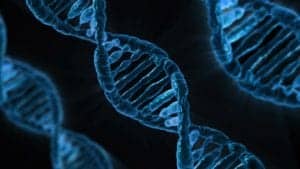Men are hardwired to build up muscle mass while women are more likely to store fat, shows a new study highlighting thousands of sex-based genetic differences.
Researchers from the Weizmann Institute in Israel mapped out approximately 6,500 genes that men and women express differently in a study that provides a microscopic look at the inner workings of our human bodies.

Targeting protein-coding genes, which appear in our DNA in substantial numbers, the researchers noticed marked differences among some genes based solely on whether the genes were in a man or woman’s body.
For example, the researchers discovered some genes that had high rates of expression in the skin tissue of men and realized that the genes, which were relatively silent in women, had to do with the growth of body hair. In other areas, the researchers found that “gene expression for muscle building was higher in men” and gene expression for storing fat was higher in women.
The study sheds light on how the complex human genome leads to certain characteristics taking hold among human beings.
“The basic genome is nearly the same in all of us, but it is utilized differently across the body and among individuals,” said study author Dr. Moran Gershoni of the Weizmann Institute. “Thus, when it comes to the differences between the sexes, we see that evolution often works on the level of gene expression.”
Evolutionary Entanglements
The majority of sex-related gene differences that the researchers discovered were contained in breast mammary tissue, accounting for about 6,000 of the 6,500 divergent gene expressions that they found.
“This remarkable sex-biased gene expression is likely due to the distinct physiologic properties of this tissue between men and women,” write the authors in BMC Biology.
The researchers hypothesize that the gene expressions they found in men’s breast tissue are likely present to “suppress lactation.”
Related: Brain Cells Actually Favor One Parent’s Genes Over the Other
The researchers also discovered other important differences that help fill out the narrative of human evolution and natural selection. For instance, they realized that genes that are sex-specific tend to incur higher rates of mutations, which can lead to health problems.
 “The more a gene was specific to one sex, the less selection we saw on the gene,” said Gershoni, who further noted that “selection was even weaker with men” compared to women.
“The more a gene was specific to one sex, the less selection we saw on the gene,” said Gershoni, who further noted that “selection was even weaker with men” compared to women.
They point to a theory of sexual evolution to make sense of their findings.
“In many species, females can produce only a limited number of offspring while males can, theoretically, father many more; so the species’ survival will depend on more viable females in the population than males,” said Professor Shmuel Pietrokovski. “Thus natural selection can be more ‘lax’ with the genes that are only harmful to males.”
Related: Women Are More Likely to Have Smartphone Addictions
Because half of the population — either men or women — are essentially disregarding the use of a sex-specific gene, troubled genes can filter down through generations, avoiding the process of natural selection.
“Paradoxically, sex-linked genes are those in which harmful mutations are more likely to be passed down, including those that impair fertility,” said Pietrokovski. “From this vantage point, men and women undergo different selection pressures and, at least to some extent, human evolution should be viewed as co-evolution. But the study also emphasizes the need for a better understanding of the differences between men and women in the genes that cause disease or respond to treatments.”
Richard Scott is a health care reporter focusing on health policy and public health. Richard keeps tabs on national health trends from his Philadelphia location and is an active member of the Association of Health Care Journalists.


![How To: ‘Fix’ Crepey Skin [Watch]](https://cdn.vitalupdates.com/wp-content/uploads/2017/05/bhmdad.png)












